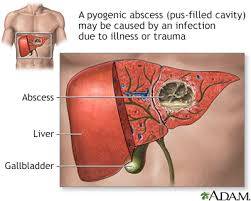A liver abscess is a localized collection of pus within the liver. Here are 20 potential factors related to liver abscess, along with signs and symptoms, effects, and solutions:
**Causes:**
1. Bacterial infection (most common cause).
2. Amoebic infection (Entamoeba histolytica).
3. Surgical complications.
4. Appendicitis.
5. Biliary tract infections.
6. Diverticulitis.
7. Trauma or injury to the liver.
8. Immune system disorders.
9. Infected liver cysts.
10. Infective endocarditis.
11. Portal vein septic thrombophlebitis.
12. Pelvic infections.
13. Travel to regions with high amoebic prevalence.
14. Recent dental procedures.
15. Infection in other parts of the body.
16. Intravenous drug use.
17. Immunodeficiency conditions.
18. Alcoholism.
19. Solid organ transplants.
20. Recent abdominal surgeries.
**Signs and Symptoms:**
1. Abdominal pain (right upper quadrant).
2. Fever and chills.
3. Jaundice (yellowing of the skin and eyes).
4. Hepatomegaly (enlarged liver).
5. Night sweats.
6. Fatigue.
7. Unexplained weight loss.
8. Nausea and vomiting.
9. Anorexia (loss of appetite).
10. Abdominal tenderness.
11. Pain radiating to the right shoulder.
12. Splenomegaly (enlarged spleen).
13. Cough and pleuritic chest pain (if abscess ruptures into the lung).
14. Diarrhea (in amoebic liver abscess).
15. Right lower lung infiltrate (in amoebic abscess).
16. Elevated liver enzymes.
17. Hypotension and tachycardia (in severe cases).
18. Night cough (in lung involvement).
19. Abdominal distension (ascites).
20. Altered mental status (hepatic encephalopathy).
**Effects:**
1. Localized pus collection in the liver.
2. Impaired liver function.
3. Rupture of the abscess into other organs (e.g., lung).
4. Risk of sepsis and septic shock.
5. Hepatomegaly (enlarged liver).
6. Splenomegaly (enlarged spleen).
7. Jaundice (in severe cases).
8. Impaired digestion and absorption of nutrients.
9. Anemia.
10. Reduced quality of life.
11. Reduced life expectancy.
12. Risk of complications during surgery.
13. Hypotension and tachycardia (in severe cases).
14. Ascites (fluid buildup in the abdomen).
15. Respiratory issues (in lung involvement).
16. Cognitive changes (hepatic encephalopathy).
17. Risk of other organ involvement.
18. Secondary infections.
19. Altered mental status.
20. Impact on the immune system.
**Solutions:**
1. Antibiotics for bacterial abscesses.
2. Antiparasitic medications (e.g., metronidazole) for amoebic abscesses.
3. Percutaneous drainage or aspiration of the abscess.
4. Surgical drainage or resection (if necessary).
5. Supportive care for complications.
6. Management of underlying conditions (e.g., biliary disease).
7. Nutrition support for malnourished individuals.
8. Liver transplant evaluation (in severe cases).
9. Preventing amoebic infection in endemic regions.
10. Control of sepsis and septic shock.
11. Management of pleural effusion (if lung involvement).
12. Antibiotics for secondary infections.
13. Psychological support and counseling.
14. Support from healthcare professionals.
15. Support from family and friends.
16. Support groups for individuals with liver abscess.
17. Regular medical monitoring.
18. Educational programs for healthcare professionals.
19. Public health initiatives to promote awareness.
20. Legal regulations and policies for infection control.
Early diagnosis and appropriate treatment are crucial in managing liver abscesses. If you suspect you have a liver abscess or are at risk, consult a healthcare professional for evaluation and guidance.



No comments yet
Be the first to share your thoughts!